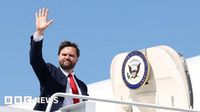As the war in Ukraine continues to escalate, tensions between Russia and Ukraine have reached new heights following a series of drone strikes and military exchanges. On Thursday, May 1, 2025, a drone attack attributed to Ukraine struck a market in the town of Oleshky, located in Russian-controlled Kherson, resulting in the tragic deaths of at least seven people and injuring more than 20 others. The drone strike occurred around 9:30 a.m. local time, coinciding with the May 1 public holiday when many residents were outdoors, according to the region's Moscow-appointed governor.
In response, Ukraine's military claimed the attack was aimed at Russian troops, asserting that only military personnel were killed in the incident. However, these claims have not been independently verified, leaving room for speculation and further accusations between the two nations. The Ukrainian military has been engaged in ongoing efforts to reclaim territories held by Russian forces since the invasion began in February 2022.
Meanwhile, the situation has been further complicated by a series of retaliatory strikes from Russia. A separate Russian attack on the Ukrainian port city of Odesa resulted in the deaths of two civilians, while a drone strike in Zaporizhzhia set a building ablaze, injuring 14 individuals, though fortunately, no fatalities were reported in that incident.
Amid these hostilities, Ukraine's SBU Security Service reported that it thwarted an assassination attempt on prominent activist and video blogger Sergiy Sternenko, who has been a vocal opponent of Russian aggression since 2014. A suspect has been detained in connection with the attempted murder.
In the realm of diplomacy, Ukrainian President Volodymyr Zelenskyy has hailed a landmark agreement with the United States regarding the sharing of profits from Ukraine's critical mineral resources. Zelenskyy described the deal as a "truly equal agreement that creates an opportunity for quite significant investment in Ukraine." This partnership is seen as a crucial step towards bolstering Ukraine's economy and securing international support against Russian aggression.
As part of ongoing efforts to increase pressure on Russia, the European Union is preparing a fresh round of sanctions, marking the 17th package of penalties imposed since the conflict began. French Foreign Minister Jean-Noël Barrot emphasized that President Vladimir Putin is the "sole obstacle" to peace in Ukraine, asserting that sanctions will remain in place until Russia withdraws its forces unconditionally. Barrot's remarks came during discussions with U.S. Senator Lindsey Graham, who has been a strong advocate for additional sanctions and tariffs on countries that continue to purchase Russian energy.
U.S. Vice President JD Vance echoed similar sentiments in a recent interview, stating that the war in Ukraine is "not going anywhere" and is "not going to end any time soon." Vance noted that it is now up to both Russia and Ukraine to find common ground to end the brutal conflict that has persisted for over three years. He emphasized the importance of a breakthrough in negotiations, suggesting that without progress, the U.S. administration would have to reconsider its level of involvement.
In a related development, the Trump administration has nominated Julie Davis, a Russian-speaking diplomat, to serve as the top U.S. envoy to Ukraine. Davis's experience in the former Soviet Union positions her well to navigate the complexities of U.S.-Ukraine relations.
As the conflict rages on, the humanitarian toll continues to mount, with civilians bearing the brunt of the violence. The recent drone strike in Oleshky serves as a stark reminder of the dangers faced by those caught in the crossfire. Amidst the chaos, calls for ceasefires have emerged, with Ukraine's foreign minister, Andrii Sybiha, advocating for an immediate 30-day ceasefire in response to Russia's announcement of a temporary three-day ceasefire to coincide with World War II anniversary celebrations.
Despite these overtures for peace, fighting has persisted, highlighting the deep-seated animosities and complexities that define the current conflict. As both sides dig in, the prospect of a peaceful resolution remains uncertain.
Furthermore, the economic landscape in Russia is shifting as over 460 international companies have ceased operations in the country since the invasion began. A study by Ukraine's Kyiv School of Economics reveals that 59 global brands have exited the Russian market, with many opting to sell or liquidate their assets. Notably, 25 companies have chosen to maintain their trademarks in Russia, ensuring their intellectual property remains protected, while others have transferred trademark rights to former subsidiaries.
The implications of these business decisions extend beyond mere economics; they reflect the broader geopolitical landscape and the shifting allegiances in response to the ongoing conflict. Companies such as McDonald's and IKEA, which initially condemned Russia's actions, have faced scrutiny as they navigate the complexities of trademark registration and potential re-entry into the Russian market.
As the situation evolves, the impact of these corporate decisions will likely play a significant role in shaping the future of international relations and economic dynamics in the region. With the war showing no signs of abating, the world watches closely as Ukraine strives to assert its sovereignty while grappling with the profound consequences of an ongoing conflict that has redefined its place on the global stage.




